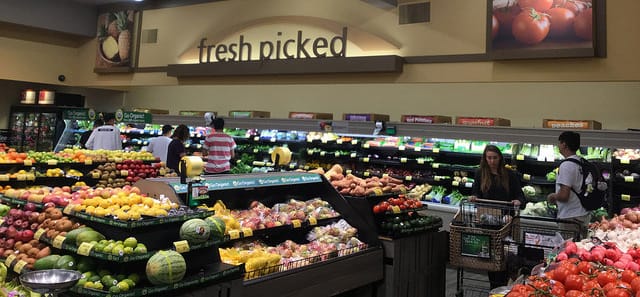Cornucopia’s Take: According to Nielsen data, organic produce sales continue to grow at a much faster pace than conventional produce sales. Nielsen posits that “mindful moms”—those seeking the best and safest food for their children and families—are driving the continued upswing in organic food purchasing.
Retail View: Data show that organics still thriving
The Produce News
by Tim Linden
Scan data at the nation’s supermarkets show that organic produce sales continue to outperform their conventional counterpart and now represent 14 percent of all dollar sales in the produce department.
 |
This nugget of information was provided by Nielsen Vice President Brian Lechner at the mid-December Organic Grower Summit in Monterey, CA. He and Organic Trade Association Chief Executive Officer Laura Batcha talked about both the numbers and consumer attitudes during a breakout session at that meeting.
Lechner said growth in the organic produce category is outpacing conventional produce growth by a factor of five to seven times. “Organics are still a very strong trend compared to conventional,” he said, even if they aren’t keeping up the torrid double-digit pace that has been in play for most years of this century.
He added that while organic product sales are increasing throughout the store, they continue to be led by gains in the produce department. One exception is the baby food aisle, where it now accounts for more than a quarter of all sales in that category.
That makes perfect sense to Lechner, who noted that the “mindful mom” is driving the gains in organic sales. He defined that demographic as female heads of households with a college degree who live in urban environments and have kids at home younger than six. That group fueled organic sales in the baby food sector, and as their kids age moms are buying organics in the produce department as well.
Lechner listed the top produce sellers in terms of growth in the organic category as blueberries, apples, bananas, mushrooms and bagged salads. What makes this list very impressive is that almost all of these items are also on top 10 volume list of almost any retailer — so the gains represent significant dollar growth.
The Nielsen data show that the premium priced organic produce items vary greatly from item to item, with most products receiving a 20 – 100 percent premium. Research shows that “mindful moms” are not price-sensitive and are willing to pay whatever it takes to buy the food that they judge to be healthier for their kids. Millennials are not particularly price-sensitive either. Lechner said it is the aging of millennials, who are now marrying and having kids, which will keep organic sales on the rise. “The wave continues to crest,” he said, noting that it appears to have a tailwind, which bodes well for the future.
Batcha continued the organic lovefest as she reported results of two different surveys focusing on the attitudes of consumers. One survey attempts to judge the mood of consumers. Batcha said that research has found that because of troubling issues surrounding both politics and increasing weather calamities, consumers have increased anxiety levels. “We are behaving like we are in a recession, even though the issues are not economic,” she said.
So what does history show that consumers do as their anxiety increases? They retreat into their clans and families, they look for safe harbors and they have a heightened distrust for institutions and corporations. They find comfort in many characteristics that also define the organic value proposition: locally-grown, clean brands, small rather than large, sustainable, transparent and healthy. “Organics are tied to many of the influencers driving consumers,” she said, adding that on a macro level, it appears that the organic trend is here to say.
Batcha said that while consumers do have distrust for institutions and government, that viewpoint does not appear to include the USDA’s certified organic seal. However, she said just labeling a product as organic is not enough to drive sales. “You must talk about other influencers; talk about the organic value proposition,” she said, adding that local, transparent, seasonal and ethical are all identifiers that resonate with consumers.
Batcha also revealed the results of a somewhat biased poll of 1,200 OTA social media followers. She allowed that the group has self-selected OTA so they are almost certainly devotees of the organic concept. Nonetheless, she said their views about the organic proposition are relevant. In an open-ended question asking respondents to pick three words associated with organics, the top choices were: safe, delicious, nutritious, fresh, clean and better.
Thirty-five percent of this group said they are not price- conscious when it comes to purchasing organic products; only 3 percent declared that they would not pay extra for an organic item. The other 62 percent admit to being sensitive to the price, with a 20 percent premium appearing to be the magic number before sales start to drop off. When asked what they do when an organic item on their shopping list is not available, 40 percent say they buy its conventional counterpart while 60 percent look for an organic substitute.
A majority of this group also said they don’t want plastic packaging.

